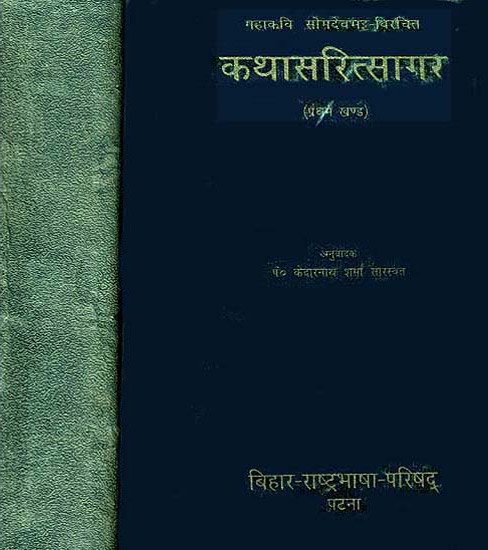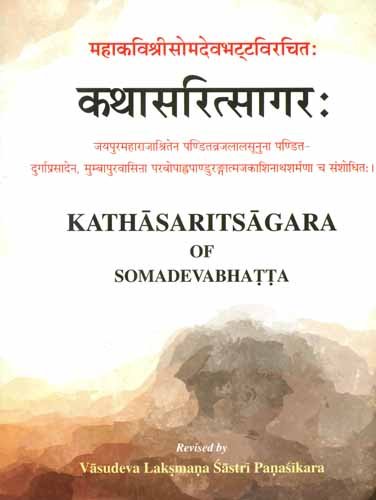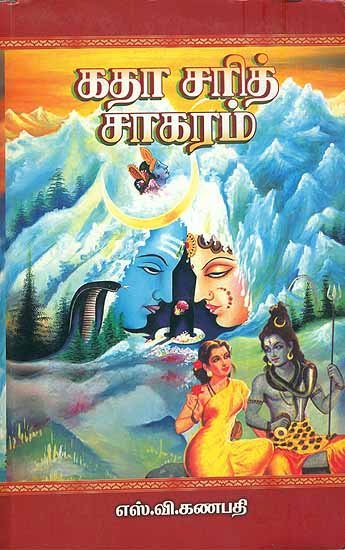Kathasaritsagara [sanskrit]
by C. H. Tawney | 2014 | 226,424 words | ISBN-13: 9789350501351
The Sanskrit edition of the Kathasaritsagara referencing the English translation and grammatical analysis. Written by Somadeva and dating from the 12th century, the Kathasaritsagara (or Katha-sarit-sagara) represents an epic legend narrating the adventures of Naravahanadatta as he strives to become the destined emperor of the Vidyadharas. Alternative titles: (Kathāsaritsāgara, कथासरित्सागर, Kathā-sarit-sāgara)
Verse 9.5.141
इति क्षपणकेनोक्ते विमृश्य स नृपो ऽब्रवीत् ।
पुत्रो मे ऽद्यापि नास्त्येव स तावज्जायतामिति ॥ १४० ॥
iti kṣapaṇakenokte vimṛśya sa nṛpo 'bravīt |
putro me 'dyāpi nāstyeva sa tāvajjāyatāmiti || 140 ||
The English translation of Kathasaritsagara Verse 9.5.141 is contained in the book The Ocean of Story by C.H. Tawney. This book is available online or you could buy the latest edition:
Read online Buy now! The English translation by C.H. Tawney (2014)
Glossary of Sanskrit terms
Note: This extracts Sanskrit terms and links to English definitions from the glossary, based on an experimental segmentation of verse (9.5.141). Some terms could be superfluous while some might not be mentioned. Click on the word to show English definitions.
Iti, Kshapanaka, Ukta, Ukti, Vimrishya, Nripa, Putra, Asmad, Adyapi, Nasti, Eva,
Analysis of Sanskrit grammar
Note: this is an experimental feature and only shows the first possible analysis of the Sanskrit text (Kathasaritsagara Verse 9.5.141). If the system was successful in segmenting the sentence, you will see of which words it is made up of, generally consisting of Nouns, Pronouns, Verbs, Participles and Indeclinables. Click on the link to show all possible derivations of the word.
- Line 1: “iti kṣapaṇakenokte vimṛśya sa nṛpo 'bravīt ”
- iti -
-
iti (indeclinable particle)[indeclinable particle]iti (noun, feminine)[compound], [adverb]
- kṣapaṇakeno -
-
kṣapaṇaka (noun, masculine)[instrumental single]
- ukte -
-
ukta (noun, masculine)[locative single]ukta (noun, neuter)[nominative dual], [vocative dual], [accusative dual], [locative single]uktā (noun, feminine)[nominative dual], [vocative single], [vocative dual], [accusative dual]ukti (noun, feminine)[vocative single]√vac -> ukta (participle, masculine)[locative single from √vac class 2 verb], [locative single from √vac class 3 verb]√vac -> ukta (participle, neuter)[nominative dual from √vac class 2 verb], [vocative dual from √vac class 2 verb], [accusative dual from √vac class 2 verb], [locative single from √vac class 2 verb], [nominative dual from √vac class 3 verb], [vocative dual from √vac class 3 verb], [accusative dual from √vac class 3 verb], [locative single from √vac class 3 verb]√vac -> uktā (participle, feminine)[nominative dual from √vac class 2 verb], [vocative single from √vac class 2 verb], [vocative dual from √vac class 2 verb], [accusative dual from √vac class 2 verb], [nominative dual from √vac class 3 verb], [vocative single from √vac class 3 verb], [vocative dual from √vac class 3 verb], [accusative dual from √vac class 3 verb]
- vimṛśya -
-
vimṛśya (indeclinable)[indeclinable]vimṛśya (noun, masculine)[compound], [vocative single]vimṛśya (noun, neuter)[compound], [vocative single]
- sa -
-
sa (noun, neuter)[compound], [vocative single]sa (noun, masculine)[nominative single]
- nṛpo' -
-
nṛpa (noun, masculine)[nominative single]
- abravīt -
-
√brū (verb class 2)[imperfect active third single]
- Line 2: “putro me 'dyāpi nāstyeva sa tāvajjāyatāmiti ”
- putro* -
-
putra (noun, masculine)[nominative single]
- me' -
-
ma (noun, masculine)[locative single]ma (noun, neuter)[nominative dual], [vocative dual], [accusative dual], [locative single]mā (noun, feminine)[nominative dual], [vocative single], [vocative dual], [accusative dual]asmad (pronoun, none)[dative single], [genitive single]
- adyāpi -
-
adyāpi (indeclinable)[indeclinable]
- nāstye -
-
nāsti (indeclinable)[indeclinable]
- eva -
-
eva (indeclinable particle)[indeclinable particle]eva (noun, masculine)[compound], [vocative single]eva (noun, neuter)[compound], [vocative single]
- sa -
-
sa (noun, neuter)[compound], [vocative single]sa (noun, masculine)[nominative single]
- Cannot analyse tāvajjāyatāmiti
Other editions:
Also see the following editions of the Sanskrit text or (alternative) English translations of the Kathasaritsagara Verse 9.5.141
Kathasaritsagar
by Kedarnath Sharma Saraswat (2005)
The Only Edition with the Sanskrit Text and its Hindi Translation (An Old and Rare Book) Set of 3 Vol.
Buy now!
Kathasaritsagara of Somadeva Bhatta (Sanskrit Text Only)
by Vasudeva Laksmana Sastri (2013)
Katha Sarit Sagar in Marathi
by H. A Bhave (1995)
Set of 5 Volumes; Published by Varada Books, Pune. 2256 pages (Throughout B/W Illustrations).
Buy now!
Katha Sarit Sagara (Tamil)
by S. V. Ganapati (எஸ். வி. கணபதி) (2014)
[கதா சரித் சாகரம்] Published by Alliance Publications.
Buy now!
Galpa Shono
by Abhijit Chattopadhyay (2014)
[গল্প শোনো] Galpa Shono: Bengali Translation of 'Suno Kahani From Katha Sarit Sagar'; 9788126015436; Published by Sahitya Akademi, Delhi.
Buy now!Preview of verse 9.5.141 in Bengali sript:
ইতি ক্ষপণকেনোক্তে বিমৃশ্য স নৃপো ঽব্রবীত্ ।
পুত্রো মে ঽদ্যাপি নাস্ত্যেব স তাবজ্জাযতামিতি ॥ ১৪০ ॥
![Kathasaritsagara [sanskrit] - book cover](/uploads/a/Katha-Sarit-Sagara.jpg)




